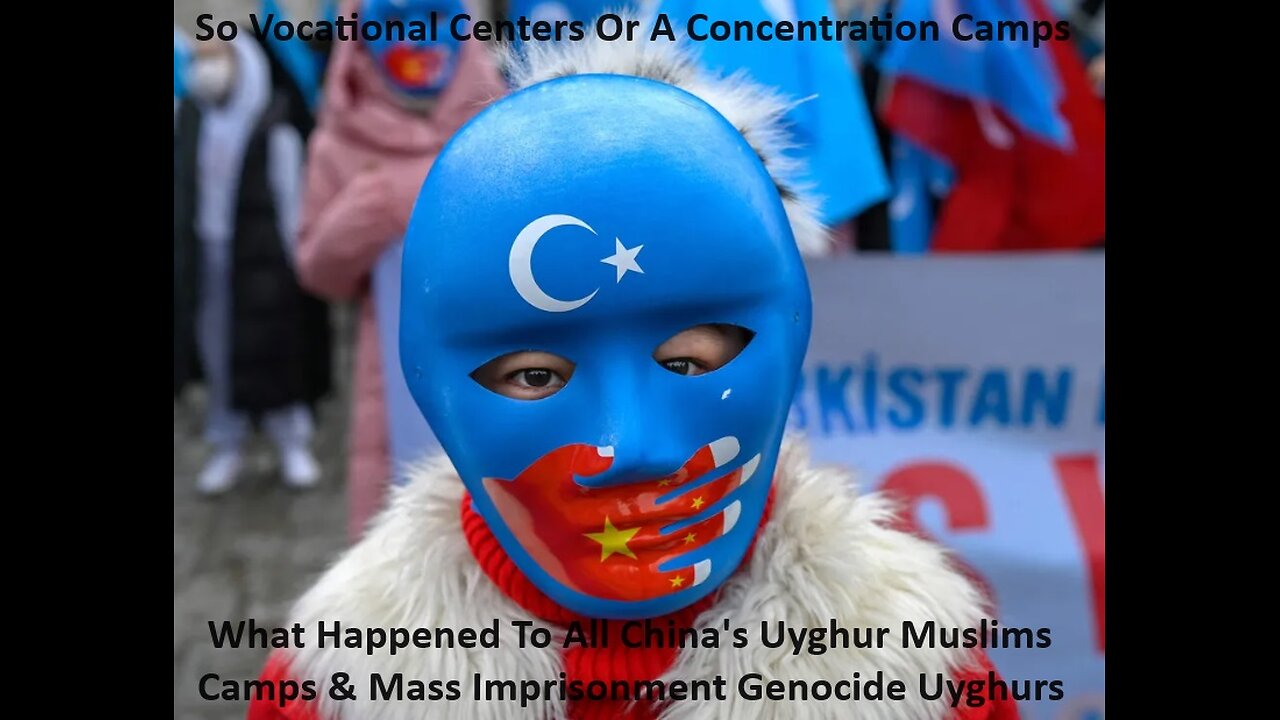Premium Only Content

So What Happened To All China's Uyghur Muslims Camps Mass Imprisonment
Hamas And Isis Other Palestinian Militant And Muslims Groups Do Not Care At All About Millions Of Dead China's Uyghur Muslims In Death Camps. It’s so bizarre that this has been going on for years and Nobody is talking about it. No politicians, no media outlets. This video doesn’t even have many views, nobody cares! So devastating. The gates are not blocked, and there are people sitting on motorcycles playing with mobile phones, and reporters are acting like agents infiltrated enemy bases. Slow motion, caused by the filter colors, it was really interesting to see so many people who had never been to China but believed everything the Western news reported. The police did not carry guns. This kind of filter and angle is very Western. There have never been so-called "re-education camps" in Xinjiang. My heart goes out to the millions of Muslims being oppressed in Palestine facing a real genocide by the West and Israel. A revealing look at the Chinese government’s mass imprisonment of an estimated two million Uyghurs and other Muslims, with undercover footage inside China's secretive Xinjiang region.
Top officials from the United States and China sit down for their first face-to-face meeting since President Joe Biden took office, testing the two countries' increasingly troubled relations.
The Congressional Black Caucus & AOC And Others Said "Death to America" 'Squad Of Four' Members Leap To Defend Ilhan Omar's Somalia Muslim Daughter After Arresting Rep. Ilhan Omar's "We Are Hamas" And "Death to America" Her Daughter Isra Hirsi We Hate American... l said Ilhan Omar's daughter Isra Hirsi was suspended from Barnard College "The daughter of Representative Ilhan Omar was suspended from Barnard College on Thursday over her participation in pro-Palestinian protests on the campus of neighboring Columbia University.
Don't people need brains to watch the news? Or the vast majority of people in the comments prove that they only listen to what they want to hear, even though none of the footage in the news is evidence! And the man who was interviewed, his English was too fluent, and apart from an old photo that had nothing to do with the interview, he also failed to provide any concrete evidence of “Concentration camps” or alleged illegal detentions!
Rep. Tlaib (D-Mich.), too, weighed in on the response, tweeting, “From UM to Vanderbilt to USC to Columbia, students across our country are being retaliated against for using their constitutional rights to protest genocide. It’s appalling.”
This Is Today April 20 2024 Democratic Party Members For Muslims Trail Of Blood Welcome To All Illegal Immigration We Hate American Some Say But Not All Muslims. Yes De-Fund The Police Now. As You Can See From This Very Peaceful Video Above... Some Muslims Say We Love The U.S.A. & The Hamas-Israel War Is Good In 2024 ?. So In A Secret Meeting By Antifa And Black Live Matter And Alexandria Ocasio-Cortez of New York, Ilhan Omar of Minnesota, Ayanna Pressley of Massachusetts, and Rashida Tlaib of Michigan. With 1,000 Other Democratic Party Members... We Need And Are Now Asking The American People For Donations Of Old & Used Toy Doll's For Be-Heading Class To Start Soon And This A Crucial Aspect Of Nonprofit Fundraising And Is Crucial You Help Us Soon And Thank You For Supporting Muslims For Hamas And Isis Are Nonprofit's Mission In 2024. - U.S.A. Machetes Sale's Up Over 800% In 1 Year... So Who Is Buying Up All The Machetes U.S.A. Now.
This Channel Information Is Not Fear Porn And Is A Wake Up Call Only. And This Info. Shared For Non-Hate And Non-Race And Historical Purposes. This Is The Pure Form Of Hate & Evil Of Earth Today And A Real True Racist Group Is The Congressional Black Caucus & Other Squad Members Hate U.S.A. Today. Planning For Sharia Law In The USA And Islamic State Rules And Laws For Everyone Who Alive Now. And To Forced Sterilization and Eugenics Programs in the United States Per Sharia Law in the 20th Century. Paid For and Pre Planned Pro-Palestinian Protests at Harvard and 100's Other University Is To Be Paid As Planned.
https://youtu.be/OO_oNQ9wg4o?si=-b85_EJNXxfnkglA
Tens Of Millions Illegal Immigrant Invasion U.S.A. Now And Are Now Protesting Us... The Real Truth About Illegal Immigration And Crime. As Of April 01 2024 The True Numbers Nearly 2,860,000 Or About 22 Percent Have A Criminal Conviction Or Pending Criminal Charges, According To data Analyzed By The House Judiciary Committee. Biden Let Us In Protesters Chanted: “Death to America!” and “Death to Israel!”
I have a question, there are over 25 million Uyghur people in Xinjiang. If China oppresses them, why haven't more than 25 million people left China? If countries such as Iraq, Syria, and Ukraine encounter crises, they can see their refugees everywhere. The 25 million Uyghurs in Xinjiang have a larger Muslim population than almost all Muslim countries, so why are Uyghurs rarely seen around the world.. Few people in the world have seen Uyghurs, what is the reason for this?? This is not logical at all. Can anyone explain?? China's transportation technology is the best in the world, with hundreds of millions of people going abroad every year. Why haven't the Uyghurs in Xinjiang escaped?? When we go to China, we can see that almost every city has many people from Xinjiang. Why don't they flee? If China wants to monitor 25 million Uyghurs, they need at least 10 million people directly or indirectly. If these people spend $50 per day, it will cost $500 million per day and around $300 billion per year. There are also many other 54 ethnic minorities in China, among which the Muslim population of the Hui ethnic group is more than that of Xinjiang. Would it be necessary to spend hundreds of billions of dollars to monitor the Muslim population of the Hui ethnic group? So what about other ethnic minorities? If China monitors its ethnic minorities, it would cost at least one trillion US dollars per year, which is impossible.. If monitored, why can Xinjiang Uyghurs be seen in almost any other city in China.. Why did Uyghurs interviewed by Western countries such as the United States acquire citizenship from both the United States and European countries?? Why can oppressed Uyghurs escape from China, while Uyghurs in any other city in China do not?? If 25 million Uyghurs flee, they can be seen in almost every corner of the world... Why is it wrong for China to arrange for criminals who commit terrorist attacks to study in technical schools, allowing them to master technology and return to society, while the United States is right to imprison them in prisons in various countries around the world and mistreat them recklessly?? Why did the United States and some European countries invade countries such as Iraq, Afghanistan, Syria, Yemen, and indiscriminately kill Muslims in these countries.. And they are also very discriminatory against Muslims in their country, why are they interested in the Muslims in Xinjiang, China? Why not Ningxia (a Muslim province with a larger Muslim population than Xinjiang) in China? Are they genuinely concerned about the lives of Muslims or what?
Fake video. I can read and speak Chinese. The woman was speaking English to the Chinese man and he didn't even respond. Most Chinese cannot speak fluent English. I didn't see any sign in any building in the video. What makes her say any of those buildings are concentration camps? For the building that have guards, she didn't show the front door and again claim that it is a concentration camp. Maybe a military building or a real prison? The other entrance that is blocked is reading: "no entry ... construction in progress". And that makes it concentration camp??? Most of folks here commenting ... I don't know ... are too naive.
It is just a vocational school, allowing marginalized people to return to normal life once again, giving jobs, giving land, giving cattle and sheep, giving houses, giving skills to learn the state invested 10,000 dollars, hoping to report the facts positively. Xinjiang does not want to have explosions in the present Xinjiang economy developed, people live and work happily, crime rate is very low, very safe area, authenticity depends on the tourism anchor, news is political needs.
And they still say that Anglo-Saxon countries can't make propaganda films? As we can see, they can! Unfortunately, they didn't spend enough money on it, so they had to operate with cheap filters and horror movie camera movements. I would be curious, for example in the USA, someone would film schools or prisons without notice, what would be the reactions. Of course, e.g. US police officers always carry out road checks with a smile and in a friendly manner. Instead of the Chinese, I would film the same thing in the UK or the USA.
China’s Repression of Uyghurs in Xinjiang More than a million Muslims have been arbitrarily detained in China’s Xinjiang region. The reeducation camps are just one part of the government’s crackdown on Uyghurs.
Summary
About eleven million Uyghurs—a mostly Muslim, Turkic-speaking ethnic group—live in the northwestern region of Xinjiang.
The Chinese government has imprisoned more than one million people since 2017 and subjected those not detained to intense surveillance, religious restrictions, forced labor, and forced sterilizations.
The United States determined that China’s actions constitute genocide, while a UN report said they could amount to crimes against humanity.
Introduction
The Chinese government has reportedly arbitrarily detained more than a million Muslims in reeducation camps since 2017. Most of the people who have been detained are Uyghur, a predominantly Turkic-speaking ethnic group primarily in China’s northwestern region of Xinjiang. Beyond the detentions, Uyghurs in the region have been subjected to intense surveillance, forced labor, and involuntary sterilizations, among other rights abuses.
The United States and several other foreign governments have described China’s actions in Xinjiang as genocide, while the UN human rights office said that the violations could constitute crimes against humanity. Chinese officials have said that they have not infringed on Uyghurs’ rights and claimed that they closed the reeducation camps in 2019. However, international journalists and researchers have documented an ongoing system of mass detention throughout the region using satellite images, individual testimonies, and leaked Chinese government documents.
When did mass detentions of Muslims start?
An estimated eight hundred thousand to two million Uyghurs and other Muslims, including ethnic Kazakhs and Uzbeks, have been detained since 2017, according to international researchers and U.S. government officials [PDF]. The Chinese government calls the facilities “vocational education and training centers;” the most common terms used by international media organizations and researchers are reeducation camps, internment camps, and detention camps. Some activists describe them as concentration camps.
Outside of the camps, the eleven million Uyghurs living in Xinjiang—officially called the Xinjiang Uyghur Autonomous Region—have continued to suffer from a decades-long crackdown by Chinese authorities.
Experts estimate that reeducation efforts started in Xinjiang in 2014 and were drastically expanded in 2017. Beginning that year, they documented the construction of new reeducation camps and expansion of existing facilities for mass detention. Reuters journalists, observing satellite imagery, found that thirty-nine of the camps almost tripled in size between April 2017 and August 2018; they covered a total area roughly the size of 140 soccer fields. Similarly, analyzing local and national budgets over the past few years, Germany-based Xinjiang expert Adrian Zenz found that construction spending on security-related facilities in Xinjiang increased by 20 billion yuan (around $2.96 billion) in 2017.
In late 2019, Xinjiang’s governor said that people detained in the reeducation camps had “graduated.” Journalists found that several camps were indeed closed. But the following year, researchers at the Australian Strategic Policy Institute (ASPI) identified [PDF] more than 380 suspected detention facilities using satellite images. They found that China refashioned some lower-security reeducation camps into formal detention centers or prisons; expanded existing detention centers; and constructed new, high-security detention centers throughout Xinjiang. (Chinese officials have said that ASPI is an anti-China tool funded by Australia and the United States.) Instead of detaining people in reeducation camps, authorities have increasingly used the formal justice system to imprison people for years. In 2022, Human Rights Watch reported that half a million people had been prosecuted since 2017, according to Xinjiang government figures. The Associated Press found that in one county, an estimated one in twenty-five people had been sentenced to prison on terrorism-related charges, all of them Uyghurs.
Hundreds of Detention Sites Across Xinjiang What has happened in the reeducation camps?
Most people detained in the reeducation camps were never charged with crimes and had no legal avenues to challenge their detentions. The detainees seem to have been targeted for a variety of reasons, according to media reports, including traveling to or contacting people from any of the twenty-six countries China considers sensitive, such as Turkey and Afghanistan; attending services at mosques; having more than three children; and sending texts containing Quranic verses. Often, their only crime is being Muslim, human rights groups say, adding that many Uyghurs have been labeled as extremists simply for practicing their religion.
Information on what happened in the camps remains limited, but many detainees who have since fled China described harsh conditions. The UN human rights office released a report [PDF] in 2022 based on interviews with dozens of people, including twenty-six individuals who were detained, that found “patterns of torture or other forms of cruel, inhuman, or degrading treatment” in the camps between 2017 and 2019.
The UN report affirmed previous findings by international journalists, researchers, and rights organizations. Various exposés showed that detainees were forced to pledge loyalty to the CCP and renounce Islam, as well as sing praises for communism and learn Mandarin. Some people reported prison-like conditions, with cameras and microphones monitoring their every move and utterance. Others said they were tortured and subjected to sleep deprivation during interrogations. Women have shared stories of sexual abuse, including rape. Some released detainees contemplated suicide or witnessed others kill themselves.
Detention also disrupted families. Children whose parents were sent to the camps were often forced to stay in state-run orphanages. Many Uyghur parents living outside of China faced a difficult choice: return home to be with their children and risk detention, or stay abroad, separated from their children and unable to contact them.
What do Chinese officials say about the camps?
Government officials first denied the camps’ existence. By late 2018, they started acknowledging that there were “vocational education and training centers” in Xinjiang. They publicly stated that the camps had two purposes: to teach Mandarin, Chinese laws, and vocational skills, and to prevent citizens from becoming influenced by extremist ideas, to “nip terrorist activities in the bud,” according to a government report. Pointing out that Xinjiang has not experienced a terrorist attack since December 2016, officials claimed the camps have prevented violence.
As global condemnation of the abuses has grown, Chinese officials and state media have worked to discredit reports on Xinjiang using a range of tactics, including disseminating disinformation and harassing activists. They have repeated a narrative that “anti-China forces” in the United States and other Western countries are spreading “vicious lies.” Beijing tried to prevent the UN human rights office from releasing its report. After its release, Chinese officials described it as false information and published a rebuttal describing how foreign governments and organizations “spread numerous rumors and lies” about Xinjiang.
Why is China targeting Uyghurs in Xinjiang?
Chinese officials are concerned that Uyghurs hold extremist and separatist ideas, and they viewed the camps as a way of eliminating threats to China’s territorial integrity, government, and population.
Xinjiang has been claimed by China since the Chinese Communist Party (CCP) took power in 1949. Some Uyghurs living there refer to the region as East Turkestan and argue that it ought to be independent from China. Xinjiang takes up one-sixth of China’s landmass and borders eight countries, including Afghanistan, Pakistan, and Kazakhstan.
Under Chinese President Xi Jinping, the CCP has pushed to Sinicize religion, or shape all religions to conform to the officially atheist party’s doctrines and the majority Han-Chinese society’s customs. Though the government recognizes five religions—Buddhism, Catholicism, Daoism, Islam, and Protestantism—it has long feared that foreigners could use religious practice to spur separatism.
The Chinese government has come to characterize any expression of Islam in Xinjiang as extremist, a reaction to past independence movements and occasional outbursts of violence. The government has blamed terrorist attacks on the East Turkestan Islamic Movement, a separatist group founded by militant Uyghurs, in recent decades. (In 2020, the United States removed the group from its list of terrorist organizations, saying there was no credible evidence that the group had operated for at least the previous decade.) Following the 9/11 attacks, the Chinese government started justifying its actions toward Uyghurs as part of the Global War on Terrorism. It said it would combat what it calls “the three evils”—separatism, religious extremism, and international terrorism—at all costs.
In 2009, rioting in Xinjiang’s capital, Ürümqi, broke out as mostly Uyghur demonstrators protested against state-incentivized Han Chinese migration in the region and widespread economic and cultural discrimination. Nearly two hundred people were killed, and experts say it marked a turning point in Beijing’s attitude toward Uyghurs. In the eyes of Beijing, all Uyghurs could potentially be terrorists or terrorist sympathizers. During the next few years, authorities blamed Uyghurs for attacks at a local government office, train station, and open-air market, as well as Tiananmen Square in Beijing.
While visiting Xinjiang in 2014, Xi warned of the “toxicity of religious extremism” and advocated for using the tools of “dictatorship” to eliminate Islamist extremism in a series of secret speeches. In the speeches, revealed by the New York Times in 2019, Xi did not explicitly call for arbitrary detention but laid the groundwork for the crackdown in Xinjiang.
In 2017, Xinjiang’s government passed an anti-extremism law that prohibited people from growing long beards and wearing veils in public. It also officially recognized the use of training centers to eliminate extremism. Arbitrary detention became widely used by regional officials under Chen Quanguo, Xinjiang’s Communist Party secretary, who moved to the region in 2016 after holding a top leadership position in Tibet. Known for increasing the number of police and security checkpoints, as well as state control over Buddhist monasteries in Tibet, Chen dramatically intensified security in Xinjiang. He repeatedly called on officials to “round up everyone who should be rounded up,” according to the New York Times report. Chen left the position in late 2021.
Are economic factors involved in this crackdown?
Xinjiang is an important link in China’s Belt and Road Initiative, a massive development plan stretching through Asia and Europe. Beijing hopes to eradicate any possibility of separatist activity to continue its development of Xinjiang, which is home to China’s largest coal and natural gas reserves. Human rights organizations have observed that the economic benefits of resource extraction and development are often disproportionately enjoyed by Han Chinese people, and Uyghur people are increasingly marginalized.
Many people who were arbitrarily detained have been forced to work, according to multiple reports [PDF]. ASPI estimated that, between 2017 and 2020, eighty thousand previously detained Uyghurs were sent to factories throughout China linked to eighty-three global brands. Researchers from the Center for Strategic and International Studies say forced labor is an important element of the government’s plan for Xinjiang’s economic development, which includes making it a hub of textile and apparel manufacturing. Chinese officials have described the policy as “poverty alleviation.”
What is happening outside the camps in Xinjiang?
International journalists who have visited the region say that Xinjiang has been turned into a surveillance state that relies on cutting-edge technology to monitor millions of people. Under Chen, Xinjiang was placed under a grid management system, as described in media reports, in which cities and villages were split into squares of about five hundred people. Each square has a police station that closely monitors inhabitants by regularly scanning their identification cards, taking their photographs and fingerprints, and searching their cell phones. In some cities, such as western Xinjiang’s Kashgar, police checkpoints are found every one hundred yards or so, and facial-recognition cameras are everywhere. The government also collects and stores citizens’ biometric data through a required program advertised as Physicals for All.
Much of that information is collected in a massive database, known as the Integrated Joint Operations Platform, which then uses artificial intelligence to create lists of so-called suspicious people. Classified Chinese government documents released by the International Consortium of Investigative Journalists (ICIJ) in 2019 revealed that more than fifteen thousand Xinjiang residents were placed in detention centers during a seven-day period in June 2017 after being flagged by the algorithm. The Chinese government called the leaked documents “pure fabrication.”
Many aspects of Muslim life have been erased, journalists reporting from Xinjiang have found. Communist Party members have been recruited since 2014 to stay in Uyghur homes and report on any perceived “extremist” behaviors, including fasting during Ramadan. Officials have destroyed thousands of mosques, often claiming the buildings were shoddily constructed and unsafe for worshippers. Halal food, which is prepared according to Islamic law, has become harder to find in Ürümqi as the local government has launched a campaign against it.
Uyghur and other minority women have reported forced sterilizations and intrauterine device insertions [PDF], and officials have threatened to detain anyone who violates birth-control orders or has too many children. Analyzing government data, Zenz found that in Xinjiang’s two prefectures with the highest proportions of Uyghurs, the natural population growth rates (which exclude population change from migration) fell by 84 percent between 2015 and 2018, and declined further still in 2019. Uyghur parents are banned from giving their babies certain names, including Mohammed and Medina.
Beijing has also pressured other governments to repatriate Uyghurs who have fled China, with a 2022 report [PDF] by the Wilson Center finding that more than 1,500 Uyghurs abroad have been detained in their host countries or forced to return to China. In 2015, for example, Thailand returned more than one hundred Uyghurs, and in 2017 Egypt deported several students. The documents released by ICIJ showed that the Chinese government instructed officials to collect information on Chinese Uyghurs living abroad and called for many to be arrested as soon as they reentered China.
What has the global response been?
Much of the world has condemned China’s detention of Uyghurs in Xinjiang. The UN human rights office has urged China to release people who have been arbitrarily detained and disclose the whereabouts of those who are missing. After the office released its report in 2022, several Western countries on the UN Human Rights Council were considering a motion against China, potentially with an investigative mechanism.
Lawmakers in several countries, including Canada and the United Kingdom, have declared that China is committing genocide against Uyghurs; the U.S. government was the first to do so, in January 2021. Many countries have sanctioned Chinese officials and entities linked to rights abuses. The European Union (EU) also sanctioned Chinese officials in 2021, marking the first time the bloc placed restrictions on China since 1989.
Additionally, foreign governments have imposed restrictions to address forced labor in Xinjiang. The United States has essentially banned all imports from the region through its Uyghur Forced Labor Prevention Act, and the United Kingdom has proposed measures to fine companies that fail to guarantee their supply chains do not use forced labor. The European Parliament adopted a nonbinding resolution in mid-2022 urging EU countries to ban imports made with forced labor.
China’s partners have been notably silent. Prioritizing their economic ties and strategic relationships with China, many governments have ignored the human rights abuses. In June 2022, sixty countries signed a statement calling for the UN human rights chief to respect that Xinjiang-related issues are “China’s internal affairs” and stating that they “oppose the politicization of human rights.” Muslim-majority countries such as Pakistan and Saudi Arabia were among the signatories; human rights groups have criticized Muslim-majority countries for condoning the abuses.
Religion in China As more people in China practice religion, the government continues to toughen oversight, increase religious persecution, and attempt to co-opt state-sanctioned religious organizations.
Summary
The Chinese Communist Party is officially atheist, but it recognizes five religions: Buddhism, Catholicism, Daoism, Islam, and Protestantism. Authorities tightly monitor registered and unregistered groups.
There are a growing number of religious believers, including those who practice folk religions and more than a dozen other banned faiths.
China has one of the largest populations of religious prisoners, and some groups, including Uyghur Muslims, face high levels of persecution.
Introduction
Religious observance in China is on the rise. Amid China’s economic boom and rapid modernization, experts point to the emergence of a spiritual vacuum as a trigger for the growing number of religious believers, particularly adherents of Christianity and traditional Chinese religious groups.
While China’s constitution allows religious belief, adherents across all religious organizations, from state-sanctioned to underground and banned groups, face intensifying persecution, repression, and pressure to adhere to Chinese Communist Party (CCP) ideology.
Freedom and Regulation
Article 36 of the Chinese constitution says that citizens “enjoy freedom of religious belief.” It bans discrimination based on religion and forbids state organs, public organizations, or individuals from compelling citizens to believe in—or not believe in—any particular faith. The State Council, the government’s administrative authority, passed regulations on religious affairs, which took effect in February 2018, to allow state-registered religious organizations to possess property, publish literature, train and approve clergy, and collect donations. Yet alongside these rights come heightened government controls. The revised rules include restrictions on religious schooling and the times and locations of religious celebrations, as well as monitoring of online religious activity and reporting donations that exceed 100,000 yuan (around $15,900).
Human Rights Watch’s China director, Sophie Richardson, says that while religious belief in China is protected by the constitution, the measures “do not guarantee [PDF] the right to practice or worship.” Religious practices are limited to “normal religious activities,” though “normal” is left undefined and can be broadly interpreted. The state recognizes five religions: Buddhism, Catholicism, Daoism, Islam, and Protestantism. The practice of any other faith is formally prohibited, although often tolerated, especially in the case of traditional Chinese beliefs. Religious organizations must register with one of five state-sanctioned patriotic religious associations, which are supervised by the State Administration for Religious Affairs (SARA).
The government’s tally of registered religious believers is around two hundred million, or less than 10 percent of the population, according to several sources, including the UN Human Rights Council’s 2018 Universal Periodic Review. Yet some independent reports suggest the number of religious adherents in China is far larger and is steadily increasing. The research and advocacy group Freedom House estimated in 2017 that there are more than 350 million religious believers in China, primarily made up of Chinese Buddhists, followed by Protestants, Muslims, Falun Gong practitioners, Catholics, and Tibetan Buddhists. Many believers do not follow organized religion and are said to practice traditional folk religion. These practitioners, along with members of underground house churches and banned religious groups, account for many of the country’s unregistered believers.
Chinese public security officials monitor both registered and unregistered religious groups to prevent activities that “disrupt public order, impair the health of citizens or interfere with the educational system of the State,” as stipulated by the Chinese constitution. In practice, however, monitoring and crackdowns often target peaceful activities that are protected under international law, say human rights watchdogs. Overall, “religious groups have been swept up in a broader tightening of CCP control over civil society [PDF] and an increasingly anti-Western ideological bent under [Chinese President] Xi Jinping,” writes Freedom House.
Under Xi, the CCP has pushed to Sinicize religion, or shape all religions to conform to the doctrines of the officially atheist party and the customs of the majority Han Chinese population. New regulations that went into effect in early 2020 require religious groups to accept and spread CCP ideology and values. Faith organizations must now get approval from the government’s religious affairs office before conducting any activities.
In addition, China is home to one of the largest populations of religious prisoners, likely numbering in the tens of thousands; while in custody, some are tortured or killed, rights groups say. Instances of arbitrary detentions and violence carried out with impunity have led the U.S. State Department to designate China as a country of particular concern over religious freedom annually since 1999.
Atheism and the CCP
The CCP is officially atheist. The party prohibits its more than ninety million party members from holding religious beliefs, and it has demanded the expulsion of party members who belong to religious organizations. Officials have said that party membership and religious beliefs are incompatible, and they discourage families of CCP members from publicly participating in religious ceremonies. Although these regulations are not always strictly enforced, the party periodically takes steps to draw a clearer line on religion. In 2017, the party’s official newspaper warned CCP members from putting faith in religion, calling it “spiritual anesthesia.”
Chinese Buddhism and Folk Religions
China has the world’s largest Buddhist population, with an estimated 185–250 million practitioners, according to Freedom House. Though Buddhism originated in India, it has a long history and tradition in China and today is the country’s largest institutionalized religion. Separately, a 2012 Pew Research Center report found that more than 294 million people, or 21 percent of China’s population, practice folk religions. Chinese folk religions have no rigid organizational structure, blend practices from Buddhism and Daoism, and are manifest in the worship of ancestors, spirits, or other local deities. Though the number of traditional Chinese religious adherents is difficult to measure accurately, the building of new temples and the restoration of old temples signals the growth of Buddhism and folk beliefs in China.
“Buddhism, Daoism, and other folk religions are seen as the most authentically Chinese religions and there is much more tolerance of these traditional religions than of Islam or Christianity,” says journalist Barbara Demick, former Beijing bureau chief for the Los Angeles Times. According to Ian Johnson, author of The Souls of China: The Return of Religion After Mao, “hundreds, if not thousands, of folk religious temples are unregistered with the SARA but are tolerated.”
Since China’s opening and reform in the 1980s, the party has been tolerant of, and tacitly approved, the rise in Buddhist practice. However, Karrie Koesel, author of Religion and Authoritarianism: Cooperation, Conflict, and the Consequences, says that “political winds can shift quite quickly in China, so having a positive, collaborative relationship with the government is important to these religious communities.” Under former Chinese leaders Jiang Zemin and Hu Jintao, the government “passively supported” [PDF] the growth of Buddhism because it believed doing so helped bolster the image of China’s peaceful rise, supported the CCP’s goal of creating a “harmonious society,” and could help to improve relations with Taiwan, according to the University of Ottawa’s Andre Laliberte.
The growth of Buddhism led to heightened visibility of its institutions, particularly Buddhist philanthropic organizations [PDF] that deliver social services to the poor amid soaring inequality in China. Since Xi has come to power, experts have noted an apparent easing of tough rhetoric against, and even a promotion of, traditional beliefs in China. Xi has expressed hope that China’s “traditional cultures” of Confucianism, Buddhism, and Daoism could help curb the country’s “moral decline.”
Tibetan Buddhism
The Tibet Autonomous Region and its adjacent provinces are home to more than six million ethnic Tibetans, most of whom practice a distinct form of Buddhism. The Dalai Lama is the spiritual leader of one of the main schools of Tibetan Buddhism. Since 1987, he and his exiled government in India have played a prominent role in garnering international support for Tibetan autonomy. Buddhist monks within Tibet have also participated in largely peaceful anti-government demonstrations, though some have included riots and self-immolations. Experts say that discontent among Tibetan Buddhists stems in part from economic disparities between ethnic Tibetans and Han Chinese, as well as from religious and political repression. Tibetans are believed to account for nearly 90 percent of the autonomous region’s population, though large numbers of Han Chinese have migrated to Tibet as part of a broader campaign by China to modernize its western regions.
China’s religious policy in Tibet is inherently tied to the ethno-religious status of Tibetan Buddhists. To quell dissent, the CCP restricts religious activity in Tibet and Tibetan communities outside of the autonomous region. The state monitors daily operations of major monasteries, with facial-recognition cameras posted outside, and it reserves the right to disapprove an individual’s application to take up religious orders; restrictions also extend to lay Tibetan Buddhists, including people who work for the government and teachers. For example, in 2018, party cadres and officials were given control over Sichuan Province’s Larung Gar, one of the world’s largest Buddhist study centers. Authorities demolished nearly half of the center in 2019, displacing up to six thousand monks and nuns.
Tibetan Buddhists face high levels of religious persecution. Authorities have reportedly detained and tortured monks and nuns for refusing to denounce the Dalai Lama, and laypeople have been ordered to replace photos of the Dalai Lama with Chinese leaders. A Tibetan child believed to be a reincarnated, high-ranking religious leader, known as the Panchen Lama, disappeared in 1995 and has not been seen since. (Beijing claims that he graduated from college, has a job, and does not want to be disturbed.) The government designated another child as the official Panchen Lama, though many Tibetans do not accept him as such.
Christian State-Sanctioned and House Churches
Since the 1980s, China has seen a significant growth in Christianity, and today Protestantism is the country’s fastest-growing religious group. There are three state-regulated Christian organizations and many underground house churches of widely varying size. The Pew Research Center estimated [PDF] that in 2010 there were sixty-seven million Christians in China, roughly 5 percent of the total population, and, of these, fifty-eight million were Protestant, including both state-sanctioned and independent churches. Others estimate this number to now be closer to one hundred million, with unregistered churchgoers outnumbering members of official churches nearly two to one. Meanwhile, the Beijing-based Chinese Academy of Social Sciences’ estimate is far smaller, tallying twenty-nine million Christian believers.
In recent years, China has witnessed a spike in state repression against both house churches and state-sanctioned Christian organizations, including campaigns to remove hundreds of rooftop crosses from churches, forced demolitions of churches, and harassment and imprisonment of Christian pastors and priests. A 2018 report [PDF] from ChinaAid, a Texas-based Christian nongovernmental organization, said that religious persecution, primarily against Christians, was on the rise. The report cited over one million cases of religious persecution in 2018. More than five thousand people were detained, including more than one thousand church leaders. One of China’s most prominent Christian voices and the founder of a large underground church, Pastor Wang Yi, was sentenced to nine years in prison in 2019 after a court charged him with subversion of state power and illegal business operations.
The Vatican has not had diplomatic ties with China, home to some ten to twelve million Catholics, since 1951. Its recognition of Taiwan and a dispute over the bishop appointment process have been major sticking points. However, in a sign of possible warming relations in 2018, the two sides reached a provisional agreement in which Pope Francis recognized several Chinese state-appointed bishops who had been excommunicated.
Islam and Uyghurs in Xinjiang
Muslims make up about 1.8 percent of China’s population, accounting for around twenty-two million people. China has ten predominantly Muslim ethnic groups, the largest of which is the Hui, an ethnic group closely related to the majority Han population and largely based in western China’s Ningxia Autonomous Region and the Gansu, Qinghai, and Yunnan provinces.
The Uyghurs, a Turkic people who live primarily in the autonomous region of Xinjiang in northwest China, are also predominantly Muslim. There are about eleven million Uyghurs in this region, making up approximately half of its population. Officials in Xinjiang tightly control religious activity, while Muslims in the rest of the country have typically enjoyed greater religious freedom. In recent years, however, Hui Muslims in northwestern China have experienced an uptick in repression, including the imprisonment of religious leaders and forced closure of mosques.
For decades, Chinese authorities have cracked down on Uyghurs in Xinjiang, claiming the community holds extremist and separatist ideas. They point to occasional outbursts of violence against government workers and civilians in the region and have blamed the East Turkestan Islamic Movement, a separatist group founded by militant Uyghurs, for several terrorist attacks throughout China. Experts say most Uyghurs do not support the violence, but many are frustrated by frequent discrimination and the influx of Han Chinese to the region, as they disproportionately benefit from economic opportunities.
In recent years, the repression has intensified. Since 2017, up to two million Muslims, most of them Uyghurs, have been arbitrarily detained in so-called reeducation camps, according to experts and foreign government officials. Detainees have reported being tortured, sexually abused, barred from practicing their religion, and forced to pledge loyalty to the CCP. Many children of those who are detained are placed in boarding schools, where they study Mandarin and CCP ideology, according to a 2019 U.S. government report. Outside of the detention centers, Uyghurs are subjected to intense surveillance, widespread religious restrictions, and forced sterilizations.
Chinese officials deny human rights abuses in the region. They maintain that the reeducation camps have two purposes: to teach Mandarin, Chinese laws, and vocational skills, and to prevent citizens from being influenced by extremist ideas. Beijing has resisted international pressure to allow outside investigators to freely travel in Xinjiang.
Banned Religious Groups
Several religious and spiritual groups, dubbed “heterodox cults” by Beijing, are subject to regular government crackdowns. The party-state has banned more than a dozen such faiths on the grounds that adherents use religion “as a camouflage, deifying their leading members, recruiting and controlling their members, and deceiving people by molding and spreading superstitious ideas, and endangering society.” Those banned include quasi-Christian groups such as the Church of Almighty God, also known as Eastern Lightning, and Falun Gong, a spiritual movement that blends aspects of Buddhism, Daoism, and traditional qigong exercise. International human rights groups, scholars of religion, and Chinese human rights lawyers have questioned such designations, criticizing the Chinese government for harsh repression against believers.
Demick says that there is likely more activity among banned organizations in China than what is widely thought. A crackdown on Falun Gong was launched in 1999 after the group organized a large, peaceful demonstration outside CCP headquarters to advocate the release of detained adherents and greater freedom to practice. At its height, the group was believed to have as many as seventy million followers; Freedom House estimates that seven to twenty million people continue to practice despite nearly two decades of persecution. The Chinese government has initiated fresh campaigns against other smaller religious groups, one notably following a deadly attack on a woman in a McDonald’s by suspected members of the Church of Almighty God.
A Continuing Revival
Religious revival among Chinese does not appear to be abating, experts say, though Beijing’s rigorous regulation of religious affairs has intensified. Some argue that state repression of religion often has less to do with religious doctrine than with a group’s organizational ability, due to fear that such a group could potentially challenge the CCP’s legitimacy.
Tsering Shakya of the University of British Columbia’s Institute of Asian Research says the fundamental problem [PDF] in the relationship between the Chinese state and religion is that “the party is willing to tolerate the emergence of religion as a purely private experience, but it is not willing to see religion expressed as a sort of collective authority.”
Despite Beijing’s concern that religious organizations may call the party’s authority into question, some claim that the threat to the CCP is overblown. Laliberte writes that “the religious landscape of China is too fragmented for any one religion to mount a credible political challenge to the regime.”
The US says China is committing genocide against the Uyghurs. Here's some of the most chilling evidence. The Uyghurs are a predominantly Muslim ethnic minority that the Chinese government views as a threat in part because some have sought autonomy.
The U.S. and China are engaged in an increasingly intense confrontation over Beijing's human rights record – exchanging near-daily salvos over allegations Xi Jinping's government is committing genocide against the Uyghur people.
The State Department announced new sanctions last week against two Chinese officials it said were directly involved in abuses against the Uyghurs, and Secretary of State Antony Blinken has said he would consider banning Chinese imports made by the Uyghurs with forced labor. At his first solo news conference, President Joe Biden vowed to be "unrelenting" in calling attention to China's human rights abuses.
The Biden administration formalized its accusations that China has engaged in "genocide and crimes against humanity" on Tuesday as part of an annual State Department human rights report. The document cites Beijing's "mass detention" of the Uyghurs, as well as evidence of forced sterilization, rape, torture and forced labor.
Some American Uyghurs have expressed new hope the U.S. will lead a global campaign to stop China's campaign against their people.
"The tide is turning," said Nury Turkel, a foreign policy expert and human rights advocate with the Hudson Institute, who himself was born in a re-education camp during China’s cultural revolution.
But China is pushing back hard, accusing the U.S. of meddling in China's internal affairs and blasting the genocide label as a fabrication of Western researchers and biased foreign media outlets.
"These anti-China forces act in collusion with each other and have staged disgusting and ridiculed farces," Sun Zhen, an official with China's foreign ministry, said at a March 20 press conference.
Top officials from the United States and China sit down for their first face-to-face meeting since President Joe Biden took office, testing the two countries' increasingly troubled relations.
The Uyghurs are a predominantly Muslim ethnic minority who live in what China refers to as the Xinjiang region, but what some Uyghurs call East Turkestan. There are an estimated 11 million Uyghurs in Xinjiang, a large patch of land in western China that shares a border with Pakistan, Kazakhstan and. The Uyghurs speak a Turkic language and have a different cultural identity than the Han Chinese population, which speaks Mandarin and is generally not religious.
The Chinese Communist government views the Uyghurs as a threat in part because some have sought greater autonomy or even a separate state. Chinese government officials allege there are extremists within the Uyghur community and have said their campaign to "re-educate" the Uyghurs is justified by terrorism concerns.
In May 2014, the Chinese government launched what it called the “Strike Hard Campaign against Violent Terrorism" in Xinjiang, which included a dramatic expansion of surveillance of the Uyghurs and a harsh crackdown on their movement and communication, according to a legal opinion issued in February by a British law firm on behalf of Uyghur human rights groups. The opinion, written by attorneys with Essex Court Chambers, concludes there is a "credible case" that China's treatment of the Uyghur people amounts to "crimes against humanity and the crime of genocide."
Chinese officials reject such accusations. They have dismissed media reports about mass detentions, rape, forced sterilization and other abuses as biased and fabricated.
"China is not doing these things. And it's very unfortunate some people, including some journalists, they start with very strong bias and prejudice," China's ambassador to the U.S., Cui Tiankai, told CNN in a March 25 interview.
Cui said China's campaign was spurred by a "mounting terrorist, extremist and violent ideology among the local population." Skeptics say there is little credible evidence to support the terrorism allegation.
Uyghurs are being detained in camps and prisons
Media outlets and researchers have used satellite images to map the Chinese government's network of camps and prisons. Experts with the Australian Strategic Policy Institute have identified at least 380 detention facilities in Xinjiang that have been newly built or expanded since 2017. Some estimates put the number of detention facilities as high as 1,400.
The human rights group Amnesty International estimates at least 1 million Uyghurs have been "arbitrarily detained" in these facilities for what China calls its "transformation-through-education” effort in Xinjiang.
The State Department report says China has engaged in "mass detention" of more than 1 million Uyghurs and other minorities, and the government has subjected another 2 million people in Xinjiang to “re-education” training in less severe settings.
Human rights: Blinken blasts the administration's 'unbalanced' emphasis on religious liberty over other human rights.
Human rights groups say the Uyghurs have been put in the camps for a variety of reasons, from attending religious ceremonies, wearing a veil or having a beard, or refusing to marry a non-Uyghur. Starting in 2017, the local government in Xinjiang began criminalizing "virtually all Islamic matters," according to an extensive report by a Washington-based think tank called the Newlines Institute for Strategy and Policy and the Raoul Wallenberg Centre for Human Rights, a consortium based in Canada.
The report, based on interviews with former detainees and other evidence, concluded China bears responsibility "for an ongoing genocide against the Uyghurs" and has breached key elements of the 1948 Genocide Convention with its "intent to destroy" an entire ethnic group.
Chinese officials have singled out one researcher in particularly harsh terms: Adrian Zenz, a German scholar who now lives in the U.S. and is a senior fellow for China studies at a group called the Victims of Communism Memorial Foundation.
During a March 20 press conference, Chinese Communist Party officials said his reports were "full of lies and fake information," among other attacks. He is "a goon fed by anti-China forces," said Sun, the foreign ministry official.
Zenz said the Chinese government has resorted to personal attacks on him because they cannot attack his research.
"My work has been very data driven based on Chinese government documents," he said. "It’s so empirically driven. That presents a very particular challenge to the Chinese government."
'Vocational centers' or 'concentration camps'?
Chinese officials say the facilities in Xinjiang are not prisons, but rather "re-education" centers aimed at “de-extremification." They argue the facilities provide Uyghurs with vocational skills, recreational activities, medical services and a host of other benefits. They also say the Uyghurs are allowed to "return home regularly."
But media reports and independent research shows that in the internment camps, Uyghurs are indoctrinated on the “backwardness” of their identity and subjected to a wide range of mental, physical and sexual abuses. They are forced to recite Chinese Communist Party propaganda and renounce Muslim religious practices.
"Being an Uyghur is a crime,” one camp guard told a detainee, according to the Newlines' report. In another instance, a detainee was told, “you don’t look like a human,” after being raped and struck by an electroshock prod, the report says.
The researchers also cite Chinese government documents which list prison supplies used to control the detainees. Among the items: electric cattle prods, Tasers, spiked clubs known as “wolf’s teeth,” pepper spray and handcuffs.
Birth prevention' campaign
According to media reports and independent researchers, Chinese officials have engaged in a forced sterilization effort targeting Uyghur women living in certain regions.
"Government documents from 2019 demonstrate plans for a campaign of mass female sterilization in rural Uyghur regions, targeting 14 and 34 percent of all married women of childbearing age in two Uyghur counties in that year alone," the Newlines report states. In one district, the percentage of women who were infertile increased by 124% between 2017 and 2018, according to the think tank's data.
Reports suggest the same is occurring inside the detention facilities. In February, the BBC published a story detailing systematic rape and torture of detainees with accounts from former detainees. The Newlines report says a number of former female detainees testified about being forcibly fitted with IUDs while in detention.
Genz and other researchers say the detention centers are part of a broader birth prevention strategy, noting many of those locked up are of child-bearing age.
As with other accusations related to the Uyghurs, Chinese officials dismiss these accounts as false. At the March 20 event, Mahmut Abduwali, an associate researcher with Xinjiang Academy of Social Sciences, cited China's country-wide family planning policies in countering Genz's research. China implemented its "one-child policy" in 1979 to limit the country's population growth, a campaign Beijing ended in 2015.
"The implementation of family planning policy in China has experienced an orderly process," Abduwali said. "It first started in the inland provinces and then moved to the frontier provinces, in the urban area first and then to the rural area, and on the Han population first and and then on the ethnic minorities."
But the Newlines report says it is part of a concerted strategy to destroy the Uyghurs.
"In the camps, Uyghur women are subjected to forced IUD insertions, abortions, and injections or medication halting their menstrual cycles, while Uyghur men of childbearing age are targeted for internment, depriving the Uyghur population of the ability to reproduce," the report says.
"As a result of these interconnected policies, growth rates in Uyghur-concentrated areas are increasingly approaching zero." China has also clamped down on Hong Kong and Tibet
While China's persecution of the Uyghurs stands out in scope and severity, Xi's government has also ramped up other types of repression.
Last year, China imposed a "national security" law on Hong Kong and used the statute's sweeping powers to conduct mass arrests of protesters and regime critics. Now, Chinese officials have dramatically curbed free, direct elections in Hong Kong.
Beijing also maintains an iron grip on Tibet, where Xi has escalated a campaign to stamp out the region's identity and culture through "re-educational patriotism."
The State Department's human rights report says China has been monitoring and disrupting telephone and internet communications in both Tibet and Xinjiang. The government installed surveillance cameras inside Tibetan monasteries, the report says, and has used a broader surveillance network to intimidate political dissidents, religious leaders and individual Tibetans and Uyghurs.
Blinken: US-China talks difficult but 'candid' Top U.S. and Chinese officials have concluded 2 days of meetings in Alaska after offering sharply different views of each other and the world in their first face-to-face talks since President Joe Biden took office.
Biden: China's Xi Jinping doesn't have 'a democratic ... bone in his body' President Joe Biden took a direct swipe a Chinese President Xi Jinping on Thursday and offered the clearest picture yet of his administration's strategy toward Beijing.
During his first solo news conference as president, Biden warned that China seeks to become the world's wealthiest and most powerful country – and to impose its repressive autocracy across the globe.
"Xi doesn't have a doesn't have a democratic – with a small ‘d’ – bone in his body," Biden said. He compared Xi to Russian President Vladimir Putin and said they both think "autocracy is the wave of the future" and that democracies can't function in an ever-more complex world.
Biden did not answer a question about whether he would keep the Trump administration's tariffs on Beijing in place. He said his approach to dealing with China would be threefold: Outcompete Beijing by exponentially increasing U.S. investment in science and technology.
Counter China's authoritarian expansionism by strengthening America's alliances with other democratic countries.
Focus the world's attention on Beijing's escalating human rights abuses.
Biden said U.S. investment in science and technology, as a percentage of gross domestic product, has dropped dramatically in recent decades, and he wants to reverse that slide. He said his administration would push major increases in funding for artificial Intelligence, quantum computing, biotech and other industries.
"China is out-investing us by a long shot, because their plan is to own that future," Biden said, adding that he wanted to make sure that does not happen.
Biden reiterated his plan to convene a summit of democracies, where China's expansionism would be a big part of the agenda.
"We have to have democracies working together," he said.
Secretary of State Antony Blinken is in Europe meeting with allies to discuss China and a bevy of other geopolitical challenges. In a speech in Brussels on Wednesday, Blinken highlighted the threat from China and said the U.S.-European Union alliance was vital to countering that.
Blinken said the Biden administration would not force its allies into an "us or them choice" on China.
"We know that our allies have complex relationships with China that won't always align perfectly, but we need to navigate these challenges together," Blinken said in a speech at NATO headquarters. "That means working with our allies to close the gaps in areas like technology and infrastructure."
Biden did not answer a question about whether his administration is considering a ban on Chinese products made from forced labor. He vowed to call out China for its human rights abuses, including its detention of more than 1 million Uyghurs and other ethnic minorities in internment camps in its Xinjiang region.
He said he told Xi directly that "as long as you and your country continue to so blatantly violate human rights, we're going to continue in an unrelenting way to call it to the attention of the world."
The Biden administration said China is engaging in "genocide" against the Uyghurs, pointing to reports of forced sterilization, rape and other abuses aimed at reducing the population's birthrate.
Biden's remarks on China came on the heels of a tense exchange between Biden's national security advisers and their Chinese counterparts during their first face-to-face meeting in Alaska last week. The meetings got off to a rocky start as U.S. and Chinese officials sparred publicly over human rights, cyberattacks and trade policies.
The Xinjiang autonomous region in China's far west has had a long history of discord between the authorities and the indigenous ethnic Uighur population. The BBC sets out why. The largest of China's administrative regions, Xinjiang borders eight countries - Mongolia, Russia, Kazakhstan, Kyrgyzstan, Tajikistan, Afghanistan, Pakistan and India - and until recently its population was mostly Uighur.
Most Uighurs are Muslim and Islam is an important part of their life and identity. Their language is related to Turkish, and they regard themselves as culturally and ethnically close to Central Asian nations.
The region's economy has largely revolved around agriculture and trade, with towns such as Kashgar thriving as hubs along the famous Silk Road.
But development has brought new residents. In the 2000 census, Han Chinese made up 40% of the population, as well as large numbers of troops stationed in the region and unknown numbers of unregistered migrants.
The region has had intermittent autonomy and occasional independence, but what is now known as Xinjiang came under Chinese rule in the 18th Century.
An East Turkestan state was briefly declared in 1949, but independence was short-lived - later that year Xinjiang officially became part of Communist China.
In the 1990s, open support for separatist groups increased after the collapse of the Soviet Union and the emergence of independent Muslim states in Central Asia.
However, Beijing suppressed demonstrations and activists went underground.
While the situation is complex, many say that ethnic tensions caused by economic and cultural factors are the root cause of the recent violence..
Major development projects have brought prosperity to Xinjiang's big cities, attracting young and technically qualified Han Chinese from eastern provinces.
The Han Chinese are said to be given the best jobs and the majority do well economically, something that has fueled resentment among Uighurs.
Activists say Uighur commercial and cultural activities have been gradually curtailed by the Chinese state. There are complaints of severe restrictions on Islam, with fewer mosques and strict control over religious schools.
Rights group Amnesty International, in a report published in 2013, said authorities criminalised "what they labelled 'illegal religious' and 'separatist' activities" and clamped down on "peaceful expressions of cultural identity".
In July 2014, some Xinjiang government departments banned Muslim civil servants from fasting during the holy month of Ramadan. It was not the first time China had restricted fasting in Xinjiang, but it followed a slew of attacks on the public attributed to Uighur extremists, prompting concerns the ban would increase tensions.
China has been accused of intensifying its crackdown on the Uighurs after street protests in the 1990s and again in the run-up to the Beijing Olympics in 2008.
But things really escalated in 2009, with large-scale ethnic rioting in the regional capital, Urumqi. Some 200 people were killed in the unrest, most of them Han Chinese, according to officials.
Security was increased and many Uighurs detained as suspects. But violence rumbled on as right groups increasingly pointed to tight control by Beijing.
In June 2012, six Uighurs reportedly tried to hijack a plane from Hotan to Urumqi before they were overpowered by passengers and crew.
There was bloodshed in April 2013 and in June that year, 27 people died in Shanshan county after police opened fire on what state media described as a mob armed with knives attacking local government buildings
Establishing facts about these incidents is difficult, because foreign journalists' access to the region is tightly controlled, but in recent months, there appears to have been a shift towards larger-scale incidents where citizens have become the target, particularly in Xinjiang.
At least 31 people were killed and more than 90 suffered injuries in May 2014 when two cars crashed through an Urumqi market and explosives were tossed into the crowd. China called it a "violent terrorist incident".
It followed a bomb and knife attack at Urumqi's south railway station in April, which killed three and injured 79 others.
We The People Of The New World Order Year Zero Thank You Let's Stop All Wars Now - https://rumble.com/v3omcs3-we-the-people-of-the-new-world-order-year-zero-thank-you-lets-stop-all-wars.html
-
 6:16
6:16
What If Everything You Were Taught Was A Lie?
11 days agoI Was Born With Male And Female Parts "Congenital Adrenal Hyperplasia" Female External Genitalia
2.65K3 -
 LIVE
LIVE
Game On!
12 hours agoAnother Sunday Without Football...
770 watching -
 17:53
17:53
Forrest Galante
13 hours agoHow I Joined a Dangerous Remote Tribe (feat. Nelk Boys)
55K11 -
 LIVE
LIVE
Vocalot
1 day agoDay 6! New Here! New Rumble Friends!? 🤙
1,613 watching -
 34:27
34:27
The Connect: With Johnny Mitchell
18 hours ago $13.72 earnedCan He Stop Them? Inside Trumps War On Mexican Drug Cartels & The New Era Of Mexican Organized Crime
35.3K22 -
 2:33:15
2:33:15
Tundra Tactical
10 hours ago $12.55 earnedLuis Valdes Of GOA Joins The Worlds Okayest Firearms Live Stream!!!
37.9K -
 1:03:41
1:03:41
Man in America
19 hours agoAre Trump & Musk the COUNTER-ELITES? w/ Derrick Broze
93.8K85 -
 3:45:08
3:45:08
DLDAfterDark
10 hours ago $11.85 earnedDLD Live! SHTF Handguns! Which Would You Choose?
50.8K4 -
 1:50:38
1:50:38
Mally_Mouse
13 hours agoSaturday Shenanigans!! - Let's Play: Mario Party Jamboree
60.1K -
 1:13:00
1:13:00
Patriots With Grit
17 hours agoWill Americans Rise Up? | Jeff Calhoun
49.9K13